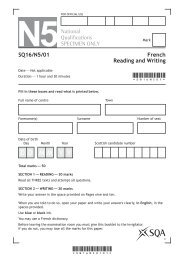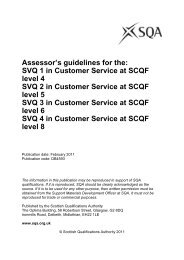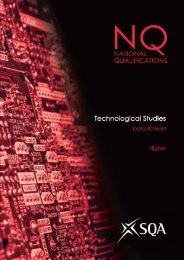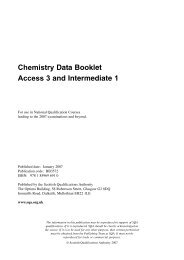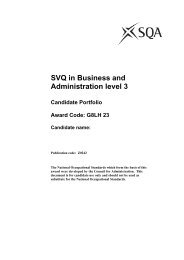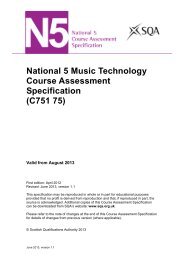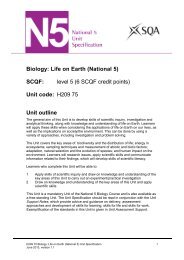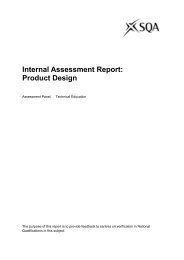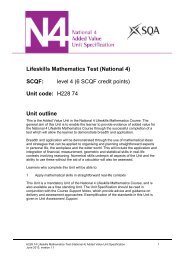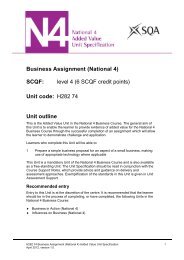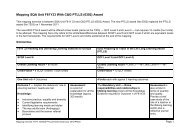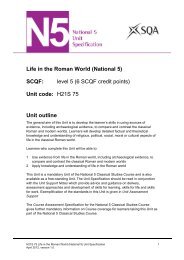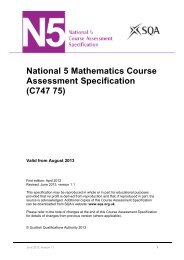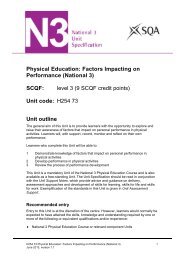National 3 Drama Course Support Notes - Scottish Qualifications ...
National 3 Drama Course Support Notes - Scottish Qualifications ...
National 3 Drama Course Support Notes - Scottish Qualifications ...
Create successful ePaper yourself
Turn your PDF publications into a flip-book with our unique Google optimized e-Paper software.
Equality and inclusion<br />
At all times, teachers/lecturers should use inclusive approaches to assessment<br />
taking into account the needs and experiences of their learners.<br />
If a learner has a disability, centres could provide, where appropriate, the<br />
following support:<br />
recording texts for visually impaired learners<br />
ensuring that learners who may have a physical disability can use suitable<br />
equipment to demonstrate an appropriate skill<br />
supporting learners with learning difficulties such as dyslexia or dyspraxia in<br />
their understanding and planning<br />
For learners with autistic spectrum disorders, engaging and responding to an<br />
appreciation of the work of others and communicating personal thoughts, feelings<br />
and ideas for stimuli and/or texts may prove difficult.<br />
Teachers/lecturers should consider the age of their learners and consider the<br />
suitability of stimuli and/or texts that will be used in the classroom. Suitability<br />
considerations should include providing a variety of choices which avoid gender<br />
stereotyping and awareness of any potential sensitivity to religion. Classroom<br />
resources and teaching should be developed avoiding stereotyping and taking<br />
account of any possible gender bias.<br />
Centres should use the flexibility within the Unit and <strong>Course</strong> structure to generate<br />
evidence of competence, making use of the variety of ways that learners can<br />
demonstrate the necessary evidence of achievement. For some learners this<br />
could include the use of ‘practical’ helpers, readers, scribes, adapted equipment<br />
or assistive technologies. Extra time may be of help for learners with autistic<br />
spectrum disorders and the use of a prompter could be used to support the<br />
learner in the assessment situation.<br />
In the <strong>Course</strong>, alternative approaches to Unit assessment can be used, taking<br />
account of the specific needs of learners. However, the centre must be satisfied<br />
that the integrity of the assessment is maintained and that the alternative<br />
approach to assessment will in fact generate the necessary evidence of<br />
achievement.<br />
It is recognised that centres have their own duties under equality and other<br />
legislation and policy initiatives. The guidance given in these <strong>Course</strong> <strong>Support</strong><br />
<strong>Notes</strong> is designed to sit alongside these duties but is specific to the delivery and<br />
assessment of the <strong>Course</strong>.<br />
It is important that centres are aware of and understand SQA’s assessment<br />
arrangements for disabled learners, and those with additional support needs,<br />
when making requests for adjustments to published assessment arrangements.<br />
Centres will find more guidance on this in the series of publications on<br />
assessment arrangements on SQA’s website: www.sqa.org.uk/sqa//14977.html.<br />
Unit <strong>Support</strong> <strong>Notes</strong> for <strong>Drama</strong>: Production Skills (<strong>National</strong> 3) Unit 39



